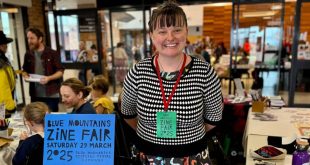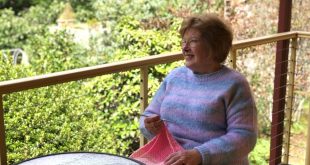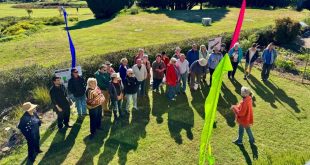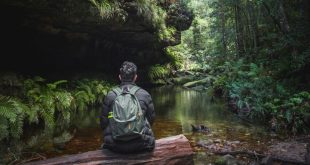
Sister Jacinta Shailer (Sisters of the Good Samaritan)
Story and photos by Lis Bastian
A 97-year-old nun, Sister Jacinta Shailer, urged attendees at the recent Blue Mountains Interfaith Gathering to create “heroic communities” focused on compassion, justice, and environmental care. The event, held at the Planetary Health Centre, brought together diverse faith traditions to address global anxieties and promote interconnectedness with nature.
Key Points:
- The Blue Mountains Interfaith Group held a Gathering on Sunday 30 March with the theme Our Spirituality, Our Land: Hope and Wonder
- The Interfaith Group brought together communities with different faith traditions to share a common goal of caring for the environment in these challenging times.
- Surrounded by the exhibition of Frogs of the Blue Mountains in the Planetary Health Centre Gallery, those present emphasised the interconnectivity of all life and the importance of protecting it for future generations.
As anxiety grips communities around the world many are asking “what can we do?”
In an inspiring speech at the Blue Mountains Interfaith Gathering at the Planetary Health Centre on Sunday 30 March, 97-year-old Sister Jacinta Shailer of the Sisters of the Good Samaritan answered this question by urging us to create ‘heroic communities.’
She reflected on how science and technology have helped deepen our knowledge of our “complex and magnificent universe” and how this changed our understanding of ‘our home’ can guide us to create the communities of the future:
“As our consciousness deepens and we mature more as human beings, we realise we cannot close our eyes or block our ears to what is going on in our world, but we are invited to join a kind of revolution: one centred on the transformative power of Love. One of the best ways of doing this is by joining, what Brian Swimme calls, heroic communities: ones that foster compassion, justice, care of the needy, creative imagining, ways of life-giving thinking, ways of contemplating the wonders of our world in the small and the large, the weird and the wonderful.
“From such communities, ripples of life, healing and joy, will flow out to our world where it is needed. This will lead to new ways of growing our food, building our homes, making art, deepening our relationships, praying together, strengthening our wisdom traditions, restoring our ecosystems and healing Mother Earth. We will learn to listen to the land and learn from her wisdom. Then we won’t fear the future, we will create it. We will revel in the beauty, grandeur, magnificence and wonder of this universe, and raise our hearts and voices in joyful gratitude, because this universe is our home.”
You can view excerpts of the day and Sister Jacinta’s full presentation here:
Sister Jacinta’s talk was the culmination of a day that brought together communities with differing faith traditions but a common desire to protect this extraordinary planet and universe we call home. All present were united by a faith in the value of compassion, love, kindness, gratitude and joy.
Sister Jacinta summed it up by speaking of “our interdependence and interconnectivity with every creature, every particle of growth, every human, every atom in this universe.”

Dharug man Chris Tobin welcoming everyone with a Smoking Ceremony
This reflected First Nation wisdom traditions which were acknowledged at the start of the day with a smoking ceremony and talk by Dharug man, Chris Tobin. During the day a video interview with Chris on ‘Art and Connection’, produced by the Baha’i community, was shared.
Photos of the Frogs of the Blue Mountains on the gallery walls where the event was held, were also a reminder of our interconnectedness with all life.
You can view a video of these frogs and listen to their calls here:

Andris Heks leading communal singing.
The program included communal singing led by Andris Heks, music by Bronwyn Kirkpatrick on Shakuhachi, and presentations by Lis Bastian from the Planetary Health Centre, Shirley Lewis (The Baglady and Living ASAP: As Sustainably As Possible), Reverend John Connor (Uniting Church), Rowe Morrow (Blue Mountains Quakers), Jessica Yuille (Brahma Kumaris), Bita Heggie (Baha’i Community of the Blue Mountains), Leona Kieran and Virginia Field (Blue Mountains Interfaith Group).

Shirley Lewis from Living ASAP
Shirley Lewis spoke of her work with Living ASAP and her recent video about offering our young people creation rather than extinction stories so we can all have hope and work together to restore the health of our planet.

Rowe Morrow (Blue Mountains Quakers)
Rowe Morrow spoke about how Quakers are dedicated to working for the environment and protecting all life for future generations.
18th century Quaker John Woolman advocated against slavery and the slave trade, cruelty to animals, economic injustices and oppression, and conscription.
He wrote:
“The produce of the earth is a gift from our gracious creator to the inhabitants, and to impoverish the earth now to support outward greatness appears to be an injury to the succeeding age.”

Jessica Yuille (Brahma Kumaris)
Jessica Yuille led a meditation and spoke of needing to change our minds and become loving, calm and honourable again so that nature and the world can ‘come good again’.

Reverend John Connor
Reverend John Connor, a member of the Uniting Church and the Wellspring Community, which is focused on spirituality and social justice, spoke of the value of living a contemplative lifestyle.
He quoted Richard Simonelli: ‘We live in a time of activity addiction. Ours is not only a non-contemplative time but an anti-contemplative time. As a people we are drowning in material advancement brought on by science and technology, as well as a compulsive need for newness and progress. We lack the balance that contemplation could bring.’
Both he and Simonelli were inspired by Thomas Merton, the contemplative, writer, and peace activist who connected Christianity and Eastern religions in a way that they had never been connected before.
Merton’s love for nature was reflected in his writing. He wrote, for example, of festivals, such as the Festival of the Rain: “What a thing it is to sit absolutely alone in the forest at night, cherished by this wonderful unintelligible, perfectly innocent speech, the most comfortable speech in the world, the talk that rain makes by itself all over the ridges, and the talk of the watercourses, everywhere in the hollows.”

Bita Heggie (Blue Mountains Baha’i Community)
Bita Heggie quoted from Baha’i (Baha’i: bahai.org.au ) writings on the theme of Nature as a Reflection of the Divine:
“So powerful is the light of unity that it can illuminate the whole world. The earth is but one country and mankind its citizens.”
“The Lord of all mankind hath fashioned this human realm to be a Garden of Eden, an earthly paradise. If, as it must, it findeth the way to harmony and peace, to love and mutual trust, it will become a true abode of bliss, a place of manifold blessings and unending delights. Therein shall be revealed the excellence of humankind, therein shall the rays of the Sun of Truth shine forth on every hand.” (Baha’u’llah)
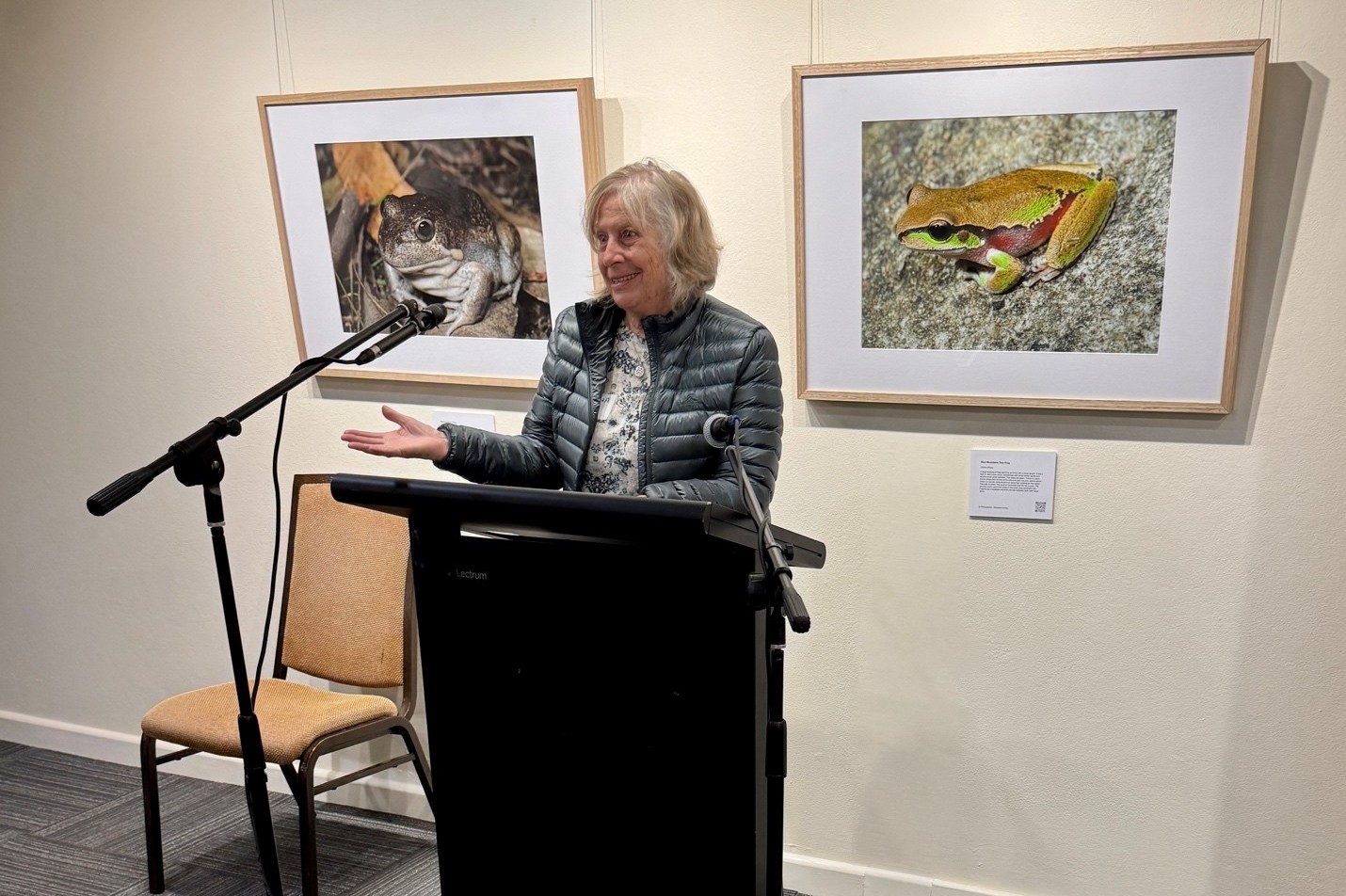
Leona Kieran (Blue Mountains Interfaith Group)
Leona Kieran, from the Blue Mountains Interfaith Group, read from “Our Land, Our Mother” by Eugene Stockton:
“We are a people formed from many fragments. There are fragments of the nations which first settled this land and there are fragments of peoples come from all around the globe. Perhaps it is our destiny to make a new world. From the tragedies of history both here and abroad, we can begin again with the ingredients of every human expression to rebuild in this land, a new humankind. But, this time mindful of ancient mistakes, we can hold steadfast to the noblest dreams of our kind.
“Most of us have been torn from our roots, have lost our ancestral dreamings. A new dreaming shared by all lies ahead of us, not behind. Our present can no longer be shaped by the divisive past, but by the uniting future. St Paul’s insights of what is to come may may well be our dream of the future: a new creation, a New Man, a cosmic Christ coming to encompass and re-unite ourselves and the land and all it holds, while in the present the Spirit groans within us and nature in one great act of giving birth. Drawn from many races, we each have seen our sun go down and there is no longer point in lamenting what has gone; rather we are to turn right round and look for the first glimmerings of a new day.”

Blue Mountains Interfaith Group organiser Virginia Field with guests at the Gathering including Cr Brent Hoare.
The Blue Mountains Interfaith Group represents world faiths and spiritual traditions locally.
If you’d like to be kept up to date about further events at the Planetary Health Centre, subscribe to the Planetary Health Newsletter here: bluemountainsplanetaryhealth.com.au/subscribe
Take Action:
- Take time out for contemplation, reflection and connection with the rest of the natural world of which we are a part.
- Explore ways to join ‘heroic communities’ that foster compassion, justice, care of the needy, creative imagining, and ways of life-giving thinking.
- Learn more about the Blue Mountains Interfaith Group: www.bminterfaith.wix.com/bmig3 or email: [email protected]
Share this article:
More from around the region
Our Planetary Health newsletter is now out! Read about the Trainee Administration Position available with the Planetary Health Centre, our upcoming workshops, and the Heroic Communities of the Blue Mountains who are finding housing for older women; creating inclusive and creative alternative media with zines; sharing their faith in the value of compassion, love, kindness, gratitude and joy; and sharing skills for improving physical and mental health and restoring habitat for wildlife, reducing textile waste and growing seeds and edible gardens.
Follow the link here:
https://bit.ly/42l8W9O (link in profile)
#jobs #planetaryhealth #housing #housingforolderwomen #skillshare #bushcare #ediblegardens #heroiccommunities #zines #seedsaving #interfaith
It was gloriously sunny and we had a fabulous day of sharing at the Planetary Health Centre yesterday, from T`ai-chi to workshops on the Frogs of the Blue Mountains, Fashion Upcycling and How to Build a Survival Garden in the Blue Mountains. We finished with a Bushcare session in which we enjoyed the beautiful bushland on the site and removed invasive weeds to expand the habitat for wildlife around our swamp. We were joined by frogs in our pond and the little echidna who returned for a swim! Thank you to everyone who shared so generously. We tasted Yacon and shared rhizomes, Purple Congo Potatoes, Oca, Turmeric, and seeds for Salsify, Egyptian Spinach, Red Mustard, Echinacea, Parsley, Chard, Radish, and Red Noodle Beans. Our next Skillshare Saturday will be on the first Saturday of May. If you`d like to be notified of all our workshops, and the meetings of our Seed Saving and Gardening Groups, subscribe to receive the fortnightly Planetary Health newsletter at any of our Local News sites like www.katoombalocalnews.com (links in profile) #skillshare #planetaryhealth #taichi #qigong #frogs #bluemountains #katoomba #fashionupcycling #upcyclingfashion #survivalgardens #seedsaving #loofah #community
Our Skillshare Saturdays are on the 1st Saturday of every month and we`re looking forward to a beautiful sunny day tomorrow for our first Morning T`ai-chi & Qigong. Fashion Upcycling is booked out this month, but we still have a few places for Frogs of the Blue Mountains, Building a Survival Garden and Planetary Health Bushcare. Bookings via Eventbrite (links in profile). For more information ph. 0407 437 553
#skillshare #planetaryhealth #sunnyday #katoomba #bluemountains #taichi #qigong #frogs #seedsaving #survivalgardens #bushcare
Imagine, if just once a month, everyone gave a few hours back to nature to repair the damage we`ve done. We would so quickly restore the habitat of so many species struggling to survive and provide the habitat for many more to flourish. Once a month, for three hours, our Planetary Health Bushcare group does just that. We`re repairing the damage of human impact and being immediately rewarded by our time in nature and the great company of the other members of our Bushcare Group. We`ll be meeting again this Saturday 5 April at 1.30pm and all are welcome to join us and learn more. Contact Karen Hising at [email protected] or call the Bushcare Office on 4780 5623 if you`d like to give it a try.
For more information about the Planetary Health Centre and how you can get involved contact the Planetary Health office on 0407 437 553
#bushcare #biodiversity #wildlife #habitat #regeneration #planetaryhealth #community #allinthistogether #bushcare #katoomba #bluemountains
In our `How to Build a Survival Garden in the Blue Mountains` workshop on Saturday 5 April, we`ll be starting an Upper Mountains Seed Saving group and sharing seeds, tubers, recipes for more unusual foods, and information about the many ways we can create more food system diversity and resilience. Learn about skirret, salsify, collards, cardoons, sea kale, Good King Henry, mangel wurzel, oca, yacon and more. Places are limited so bookings essential here (link in profile) : bit.ly/4kVAUA8
#foodsystems #foodsecurity #fooddiversity #foodresilience #biodiversity #planetaryhealth #healthydiet #plantbased #katoomba #bluemountains
Was that a frog or cricket you heard? Check out our video matching the photos of the 20 frogs of the Blue Mountains Mountains with their calls so you can learn the difference. View our exhibition, learn how to use the FrogID app, and how to build a frog pond and frog hotel, at our workshop this Saturday 5 April at 9am. Bookings via via link in profile. You can view our full video on YouTube (link in profile). Subscribe for more great content. #frogs #bluemountainsfrogs #planetaryhealth #katoomba #frogcalls #exhibition #workshop
A huge thank you to the Blue Mountains Interfaith Group for organising an inspiring afternoon that brought community together and renewed our sense of connection, hope, wonder, shared purpose and commitment to care for our extraordinary planet. We had a full house with the Frogs of the Blue Mountains looking over our shoulders! Next Saturday 5 April we`ll be launching Saturday morning T`ai-chi and Qigong which will continue on the first Saturday of every month. Bookings essential here (link in profile): bit.ly/3Rn9RzY #interfaith #hope #wonder #commitment #connection #community #planetaryhealth #katoomba #bluemountains #taichi #qigong


